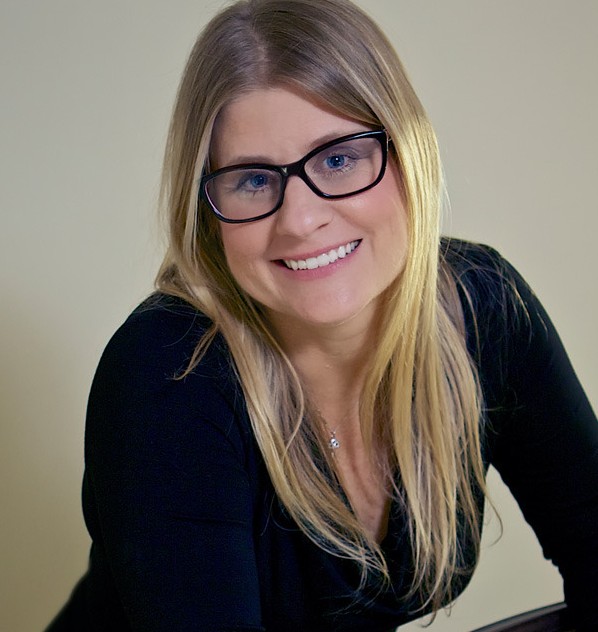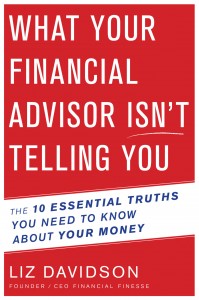
Money is such an important topic. We are always trying to get more of it or are worried about our lack of it. Of course, some of our early spending habits can be defined by our parents and their relationship with money and so we reached out to Financial Finesse CEO Liz Davidson to talk cash and some of the money myths that plague women.
Her financial education company, based in El Segundo, Calif. provides personalized and innovative financial education and counseling programs to over 2.4 million employees at over 600 organizations. Davidson’s new book, “What Your Financial Advisor Isn’t Telling You: The 10 Essential Truths You Need to Know About Your Money,” is flying off shelves because people are hungry for information that helps strengthen their financial situation. Davidson said that finance knowledge IS power.
Here are the three money myths she says are holding us back:
Money Myth #1: I’m not good with money. Lots of people worry they aren’t good with money, but for some reason women seem to say it more. Financial confidence comes from knowing the basic principles of financial wellness and applying them in your daily life to achieve financial balance. The bottom line – studies have repeatedly shown that women who have a foundational level of financial education are better at long term financial planning and investing than men. It’s really a matter of building confidence and knowledge. That’s why I wrote “What Your Financial Advisor Isn’t Telling You: The 10 Essential Truths You Need to Know About Your Money.”
Knowledge is power. The good news is that you don’t have to know everything– just the important things. The book shows you how, by doing things just a little differently, you can become much more financially secure. Women are masters at sticking to a plan once they have one.
Money Myth #2: Someone else will do it for me. No one cares more about your money than you do. According to a Prudential study, 95% of women will be their family’s primary financial decision maker at some point in their lives. We can’t outsource our financial wellness to someone else. Even if you use an advisor, it’s up to you to make sure they understand your goals.
Money Myth #3: I have to make a lot of money to be an investor. It’s not how much you make, it’s how much you keep. I wrote a whole chapter in my book about how you can become an automatic millionaire by saving and investing a manageable percentage of your income in tax-advantaged accounts.
I couldn’t let Davidson go without delving a little deeper into the money habits of women. And I wondered if men and women have a different relationship with money.
Natasha Clark (Natasha): Do you think we have a different relationship with money than our male peers?
Liz Davidson (Liz): Women are more likely to have higher levels of financial stress. For example, our research shows that the highest levels of financial stress are among working mothers making less than $60,000 per year – 55% reporting high or overwhelming financial stress. Plus, there are basic demographic facts: our research also shows there’s a Gender Gap in Retirement Preparedness. The median 45 year old working woman needs to save $1.26 for every dollar a man needs to save to replace her income in retirement. In today’s modern economy, there is also increasing financial complexity. All Americans face the challenge of saving for their own retirement, navigating the course of their careers, managing the fire hose of financial decisions and balancing income and expenses. There is good news, though. We see in our tracking that women are much more likely than men to use financial wellness programs offered by their employers. That really pays off, because our data shows that 89% of employees take at least one action to improve their finances within 30 days of participating in a workplace financial wellness program.
Natasha: What are three tips you would give women entrepreneurs when it comes to getting their finances in order for the New Year?
Liz:
- Make your healthy financial habits part of who you are rather than something you have to force yourself to do. That is the essence of behavior change – when doing something becomes a part of who you are, rather than something you have to force yourself to do. Financial wellness requires the same kind of mind shift for many people. The financially well person recognizes that taking care of their financial health is as important as taking care of their physical health.
- Take the journey to financial wellness with your friends. Working in groups allows for accountability and mutual support – something that’s particularly important for women entrepreneurs who are very busy running their businesses and can feel like the burden is all on their shoulders. Community makes the process so much more pleasant – something you look forward to, as opposed to something you feel forced to do. That’s why, in conjunction with the release of mybook on January 5th, I’ve set up a companion website, http://www.financialfinesse.com/financialindependenceday where readers can access resources to form their own Financial Independence Day groups. The website offers access to a sample of the tools and resources employees receive from Financial Finesse’s unbiased workplace financial wellness programs. Readers interested in forming their own Financial Independence Day groups can download an easy guide to get started. Group leaders will also have access to a private Facebook group where they can share ideas with each other and receive occasional tips from Financial Finesse’s CERTIFIED FINANCIAL PLANNER™ team. I am also holding a free kick-off webcast January 28th for people interested in starting their own Financial Independence Day group. To sign up, simply email a copy of your receipt showing purchase of the book to WYFAITYbook@financialfinesse.com.
- Start small. The biggest mistake people make when they try to improve their finances is to create an unrealistic plan that requires undue sacrifice. The reality is that most people don’t need to make changes that compromise their lifestyle; in fact, the right changes can actually make your life better because you eliminate expenses that you later regret, automate things that you used to try to do manually, and take advantage of employee benefits that can save you thousands of dollars a year or more. Be kind to yourself and set yourself up for success by focusing on those things that you not only can easily do but get enjoyment from doing. After that, you may decide to go further– and build upon your progress– but at that point, if you’re on the right track, you should actively look forward to this process. That’s how you create lifelong habits.
 Natasha: What inspired you to write, “What Your Financial Advisor Isn’t Telling You?”
Natasha: What inspired you to write, “What Your Financial Advisor Isn’t Telling You?”
Liz: I wrote [it] because it simply needed to be written. People NEED this information. It’s not that financial advisors are bad; in fact I devote a whole chapter on how invaluable a great advisor can be when you really need one. The problem is that people expect too much from their advisors — often thinking their advisors will make them financially secure, when that is actually their own responsibility. Contrary to popular opinion, most of the greatest drivers of building wealth have nothing to do with an advisor – your marriage or life partner, the benefits choices you make at work, using credit and debt wisely and automating your saving and investing behavior.
I hope that the book will really be a huge mind shift and wake-up call for people— that they’ll recognize that taking care of their financial health is as important as taking care of their physical health and that they will take control of their finances in a way that people are not currently doing.
Learn more about Liz and her work here.






Add Comment